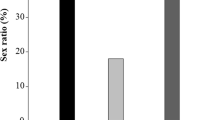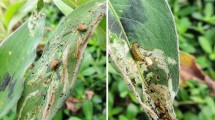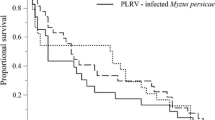Abstract
The cowpea aphid, Aphis craccivora Koch (Hemiptera: Aphididae) is one of the important pests of grass pea, Lathyrus sativus L. (Fabaceae). Severe infestation by this aphid on grass pea plants retards plant growth and reduces seed yield. Therefore, it is obligatory to study the biology of A. craccivora by age-stage, two-sex approach and the probing behavior on the leaves of two grass pea cultivars [Nirmal B-1 (NIR) and BIO L 212 Ratan (BIO)]. A correlation analysis was performed to notice the relationship with the nutrients (total proteins, carbohydrates, amino acids, lipids, and nitrogen) and antinutrients (total tannins, flavonols, and phenols) of leaves and the life table parameters of A. craccivora. Eighteen free amino acids (FAAs) were detected and estimated in leaves by GC-MS and GC-FID, respectively, and glutamic acid was predominant. The amount of FAAs was higher in NIR than BIO. The preadult duration of A. craccivora was shorter on NIR (9.46 ± 0.13 days) than BIO (10.51 ± 0.16 days), while adults lived longer on NIR (16.07 ± 0.22 days) than BIO (14.01 ± 0.20 days). Higher fecundity, intrinsic rate of increase (rm), and net reproductive rate (R0) of A. craccivora in NIR were influenced by greater quantities of nutrients and lower quantities of antinutrients in NIR than BIO. FAAs showed positive relation with mean time spent probing by A. craccivora, and this was higher in NIR than BIO. This study suggested that partially resistant BIO cultivar could be encouraged for cultivation.





Similar content being viewed by others
Data Availability material (data transparency)
The authors confirm that the data supporting the findings of this study are available within the article.
References
Akça I, Ayvaz T, Yazici E, Smith CL, Chi H (2015) Demography and population projection of Aphis fabae (Hemiptera: Aphididae): with additional comments on life table research criteria. J Econ Entomol 108:1466–1478. https://doi.org/10.1093/jee/tov187
Annan IB, Tingey WM, Schaefers GA (1997) Population dynamics and clonal comparisons of cowpea aphid (Homoptera: Aphididae) on resistant and susceptible cowpea cultivars. Environ Entomol 26:250–255. https://doi.org/10.1093/ee/26.2.250
Annan IB, Tingey WM, Schaefers GA, Tjallingii WF, Backus EA, Saxena KN (2000) Stylet penetration activities by Aphis craccivora (Homoptera: Aphididae) on plants and excised plant parts of resistant and susceptible cultivars of cowpea (Leguminosae). Ann Entomol Soc Am 93:133–140. https://doi.org/10.1603/0013-8746(2000)093[0133:SPABAC]2.0.CO;2
Arslan M (2017) Defining free amino acid contents of grass pea (Lathyrus sativus) genotypes in Turkey. Cog Chem 3:1. https://doi.org/10.1080/23312009.2017.1302311
Awmack CS, Leather SR (2002) Host plant quality and fecundity in herbivorous insects. Ann Rev Entomol 47:817–844. https://doi.org/10.1146/annurev.ento.47.091201.145300
Berberet RC, Giles KL, Zarrabi AA, Payton ME (2009) Development, reproduction, and within-plant infestation patterns of Aphis craccivora (Homoptera: Aphididae) on alfalfa. Environ Entomol 38:1765–1771. https://doi.org/10.1603/022.038.0630
Brady CM, White JA (2013) Cowpea aphid (Aphis craccivora) associated with different host plants has different facultative endosymbionts. Ecol Entomol 38:433–437. https://doi.org/10.1111/een.12020
Bray HG, Thorpe WV (1954) Analysis of phenolic compounds of interest in metabolism. Methods Biochem Anal 1:27–52. https://doi.org/10.1002/9780470110171.ch2
Chi H (1988) Life-table analysis incorporating both sexes and variable development rates among individuals. Environ Entomol 17:26–34. https://doi.org/10.1093/ee/17.1.26
Chi H (1990) Timing of control based on the stage structure of pest populations: a simulation approach. J Econ Entomol 83:1143–1150. https://doi.org/10.1093/jee/83.4.1143
Chi H (2021a) TWOSEX-MSChart: a computer program for age stage, two-sex life table analysis. National Chung Hsing University, Taichung, Taiwan. http://140.120.197.173/Ecology/Download/TwosexMSChart.zip. Accessed 07 Dec 2021
Chi H (2021b) TIMING-MSChart: a computer program for population projection based on age-stage, two-sex life table. National Chung Hsing University, Taichung, Taiwan. http://140.120.197.173/Ecology/Download/Timing-MSChart.rar. Accessed 07 Dec 2021
Chi H, Getz WM (1988) Mass rearing and harvesting based on an age-stage, two-sex life table: a potato tuberworm (Lepidoptera: Gelechiidae) case study. Environ Entomol 17:18–25. https://doi.org/10.1093/ee/17.1.18
Chi H, Liu H (1985) Two new methods for the study of insect population ecology. Bull Inst Zool Acad Sin 24:225–240
Chi H, Su H-Y (2006) Age-stage, two-sex life tables of Aphidius gifuensis (Ashmead) (Hymenoptera: Braconidae) and its host Myzus persicae (Sulzer) (Homoptera: Aphididae) with mathematical proof of the relationship between female fecundity and the net reproductive rate. Environ Entomol 35:10–21. https://doi.org/10.1603/0046-225X-35.1.10
Das S, Koner A, Barik A (2019) Biology and life history of Lema praeusta (Fab.) (Coleoptera: Chrysomelidae), a biocontrol agent of two Commelinaceae weeds, Commelina benghalensis and Murdannia nudiflora. Bull Entomol Res 109:463–471. https://doi.org/10.1017/S0007485318000731
de Melo Júnior LC, Silva PRR, Gomes Neto AV, Moreira SI, dos Santos MF, de França SM (2019) Resistance in lima bean to Aphis craccivora (Hemiptera: Aphididae). Phytoparasitica 47:187–196. https://doi.org/10.1007/s12600-019-00733-2
Debnath R, Mobarak SH, Mitra P, Barik A (2020) Comparative performance and digestive physiology of Diaphania indica (Lepidoptera: Crambidae) on Trichosanthes anguina (Cucurbitaceae) cultivars. Bull Entomol Res 110:756–766. https://doi.org/10.1017/S0007485320000255
Descamps LR, Sanchez-Chopa C, Bizet-Turovsky J (2015) Resistance in alfalfa to Aphis craccivora Koch. Chil J Agric Res 75:451–456. https://doi.org/10.4067/S0718-58392015000500010
Douglas AE (2003) The nutritional physiology of aphids. Adv Insect Physiol 31:73–140. https://doi.org/10.1016/S0065-2806(03)31002-1
Dubois M, Gilles KA, Hamilton JK, Rebers PA, Smith F (1956) Colorimetric method for determination of sugars and related substances. Anal Chem 28:350–356. https://doi.org/10.1021/ac60111a017
Elmer HS, Brawner OL (1975) Control of brown soft scale in Central Valley. Citrograph 60:402–403
Florencio-Ortiz V, Sellés-Marchart S, Zubcoff-Vallejo J, Jander G, Casas JL (2018) Changes in the free amino acid composition of Capsicum annuum (pepper) leaves in response to Myzus persicae (green peach aphid) infestation. A comparison with water stress. PLoS ONE 13:e0198093. https://doi.org/10.1371/journal.pone.0198093
Folch J, Lees M, Sloane Stanley GH (1957) A simple method for the isolation and purification of total lipids from animal tissues. J Biol Chem 226:497–509. https://doi.org/10.1016/s0021-9258(18)64849-5
Givovich A, Weibull J, Pettersson J (1988) Cowpea aphid performance and behaviour on two resistant cowpea lines. Entomol Exp Appl 49:259–264. https://doi.org/10.1111/j.1570-7458.1988.tb01187.x
Golizadeh A, Ghavidel S, Razmjou J, Fathi SAA, Hassanpour M (2017a) Comparative life table analysis of Tetranychus urticae Koch (Acari: Tetranychidae) on ten rose cultivars. Acarologia 57:607–616. https://doi.org/10.24349/acarologia/20174176
Golizadeh A, Jafari-Behi V, Razmjou J, Naseri B, Hassanpour M (2017b) Population growth parameters of rose aphid, Macrosiphum rosae (Hemiptera: Aphididae) on different rose cultivars. Neotrop Entomol 46:100–106. https://doi.org/10.1007/s13744-016-0428-4
Grela ER, Rybiński W, Klebaniuk R, Matras J (2010) Morphological characteristics of some accessions of grass pea (Lathyrus sativus L.) grown in Europe and nutritional traits of their seeds. Genet Resour Crop Evol 57:693–701. https://doi.org/10.1007/s10722-009-9505-4
Guerrieri E, Digilio MC (2008) Aphid-plant interactions: a review. J Plant Interact 3:223–232. https://doi.org/10.1080/17429140802567173
Gutierrez AP, Morgan DJ, Havenstein DE (1971) The ecology of Aphis craccivora Koch and subterranean clover stunt Virus. I. The phenology of aphid populations and the epidemiology of virus in pastures in South-East Australia. J Appl Ecol 8:699–721. https://doi.org/10.2307/2402678
Howell CR, Bell AA, Stipanovic RD (1976) Effect of aging on flavonoid content and resistance of cotton leaves to verticillium wilt. Physiol Plant Pathol 8:181–188. https://doi.org/10.1016/0048-4059(76)90051-5
Huang Y-B, Chi H (2011) The age-stage, two-sex life table with an offspring sex ratio dependent on female age. J Agric For 60:337–345. https://doi.org/10.30089/JAF.201112.0006
Jalalipour R, Sahragard A, Madahi K, Karimi-Malati A (2017) Comparative life table of Aphis craccivora (Hem.: Aphididae) on host plant, Robinia pseudoacacia under natural and laboratory conditions. J Entomol Soc Iran 36:249–257. https://www.sid.ir/en/journal/ViewPaper.aspx?id=547727
Jammulamadaka N, Burgula S, Medisetty R, Ilavazhagan G, Rao SLN, Singh SS (2011) β-N-oxalyl-L-α,β-diaminopropionic acid regulates mitogen-activated protein kinase signaling by down-regulation of phosphatidylethanolamine-binding protein 1. J Neurochem 118:176–186. https://doi.org/10.1111/j.1471-4159.2011.07299.x
Kaakeh W, Dutcher JD (1993) Population parameters and probing behavior of cowpea aphid (Homoptera: Aphididae), on preferred and non-preferred host cover crops. J Entomol Sci 28:145–155. https://doi.org/10.18474/0749-8004-28.2.145
Kamphuis LG, Gao L, Singh KB (2012) Identification and characterization of resistance to cowpea aphid (Aphis craccivora Koch) in Medicago truncatula. BMC Plant Biol 12:101. https://doi.org/10.1186/1471-2229-12-101
Ke Q, Costa M (2006) Hypoxia-inducible factor-1 (HIF-1). Mol Pharmacol 70:1469–1480. https://doi.org/10.1124/mol.106.027029
Koner A, Debnath R, Barik A (2019) Age-stage, two-sex life table and food utilization efficiencies of Galerucella placida Baly (Coleoptera: Chrysomelidae) on two Polygonaceae weeds. J Asia-Pac Entomol 22:1136–1144. https://doi.org/10.1016/j.aspen.2019.10.001
Lambein F, Kuo Y-H (2009) Lathyrism. Grain Legum 54:8–9
Lambein F, Travella S, Kuo Y-H, Montagu MV, Heijde M (2019) Grass pea (Lathyrus sativus L.): orphan crop, nutraceutical or just plain food? Planta 250:821–838. https://doi.org/10.1007/s00425-018-03084-0
Lan G, Chen P, Sun Q, Fang S (2013) Methods for treating hemorrhagic conditions.United States Patent, No. US8,362,081 B2. https://patents.google.com/patent/US8362081B2/en
Llorent-Martínez EJ, Zengin G, Fernández-de Córdova ML, Bender O, Atalay A, Ceylan R, Mollica A, Mocan A, Uysal S, Guler GO, Aktumsek A (2017) Traditionally used Lathyrus species: phytochemical composition, antioxidant activity, enzyme inhibitory properties, cytotoxic effects, and in silico studies of L. czeczottianus and L. nissolia. Front Pharmacol 8:83. https://doi.org/10.3389/fphar.2017.00083
Lowry OH, Rosebrough NJ, Farr AL, Randall RJ (1951) Protein measurement with the folin phenol reagent. J Biol Chem 193:265–275. https://doi.org/10.1016/s0021-9258(19)52451-6
Machacha M, Obopile M, Tshegofatso ABN, Tiroesele B, Gwafila C, Ramokapane M (2012) Demographic parameters of cowpea aphid Aphis craccivora (Homoptera: Aphididae) on different Botswana cowpea landraces. Int J Trop Insect Sci 32:189–193. https://doi.org/10.1017/S1742758412000318
Mitra S, Mobarak SH, Barik A (2021) Age-stage, two-sex life table of the biocontrol agent, Altica cyanea on three Ludwigia species. Biologia 76:101–112. https://doi.org/10.2478/s11756-020-00503-0
Mobarak SH, Debnath R, Koner A, Barik A (2022) Effect of temperature for mass rearing of Spilosoma obliqua on an artificial diet using age-stage, two-sex life table approach. Biologia 77:1327–1335. https://doi.org/10.1007/s11756-022-01054-2
Mobarak SH, Roy N, Barik A (2020) Two-sex life table and feeding dynamics of Spilosoma obliqua Walker (Lepidoptera: Arctiidae) on three green gram cultivars. Bull Entomol Res 110:219–230. https://doi.org/10.1017/S0007485319000452
Moore S, Stein WH (1948) Photometric ninhydrin method for use in the chromatography of amino acids. J Biol Chem 176:367–388. https://doi.org/10.1016/s0021-9258(18)51034-6
Mykhailenko O, Ivanauskas L, Bezruk I, Lesyk R, Georgiyants V (2020) Comparative investigation of amino acids content in the dry extracts of Juno bucharica, Gladiolus hybrid Zefir, Iris hungarica, Iris variegata and Crocus sativus raw materials of Ukrainian flora. Sci Pharm 88:8. https://doi.org/10.3390/scipharm88010008
Obopile M, Ositile B (2010) Life table and population parameters of cowpea aphid, Aphis craccivora Koch (Homoptera: Aphididae) on five cowpea Vigna unguiculata (L. Walp.) varieties. J Pest Sci 83:9–14. https://doi.org/10.1007/s10340-009-0262-0
Petterson DS, Sipsas S, Mackintosh JB (1997) The chemical composition and nutritive value of Australian pulses, 2nd edn. Grains Research and Development Corporation, Canberra
Pollard DG (1973) Plant penetration by feeding aphids (Hemiptera, Aphidoidea): a review. Bull Entomol Res 62:631–714. https://doi.org/10.1017/s0007485300005526
Rakhshan, Ahmad ME (2018) Effect of fabaceous plants on the biological performance of Aphis craccivora Koch (Hemiptera: Aphididae). Am J Life Sci Res 6:131–138. https://doi.org/10.13140/RG.2.2.29934.87365
Rakhshan, Ahmad ME (2019) Influence of leguminous plants on the life-table statistics of Aphis craccivora Koch (Hemiptera: Aphididae). J Adv Res Agric Sci Technol 2:29–35
Rao SLN (2011) A look at the brighter facets of β-N-oxalyl-L-α,β-diaminopropionic acid, homoarginine and the grass pea. Food Chem Toxicol 49:620–622. https://doi.org/10.1016/j.fct.2010.06.054
Rizvi AH, Sarker A, Dogra A (2017) Enhancing grasspea (Lathyrus sativus) production in problematic soils of South Asia for nutritional security. Indian J Genet Plant Breed 76:583–592
https://hdl.handle.net/20.500.11766/6299
Sarkar N, Mukherjee A, Barik A (2016) Effect of bitter gourd (Cucurbitaceae) foliar constituents on development and reproduction of Epilachna dodecastigma (Coleoptera: Coccinellidae). Int J Trop Insect Sci 36:195–203. https://doi.org/10.1017/s1742758416000199
Scalbert A (1992) Quantitative methods for the estimation of tannins in plant tissues. Plant polyphenols. In: Hemingway RW, Laks PE (eds) Synthesis properties, significance, vol 59. Plenum Press, New York, pp 259–280
Sharma D, Singh P, Singh SS (2018) β-N-oxalyl-L-α,β-diaminopropionic acid induces wound healing by stabilizing HIF-1α and modulating associated protein expression. Phytomedicine 44:9–19. https://doi.org/10.1016/j.phymed.2018.04.024
Singh SS, Rao SLN (2013) Lessons from neurolathyrism: a disease of the past & the future of Lathyrus sativus (Khesari dal). Indian J Med Res 138:32–37
Soffan A, Aldawood AS (2014) Biology and demographic growth parameters of cowpea aphid (Aphis craccivora) on faba bean (Vicia faba) cultivars. J Insect Sci 14:1–10. https://doi.org/10.1673/031.014.120
Suzuki DK, Fukushi Y, Akimoto S (2009) Do aphid galls provide good nutrients for the aphids?: Comparisons of amino acid concentrations in galls among Tetraneura species (Aphididae: Eriosomatinae). Arthropod-Plant Interact 3:241–247. https://doi.org/10.1007/s11829-009-9064-9
Traicevski V, Ward SA (1994) Birth weight and the rate of increase in the cowpea aphid Aphis craccivora (Homoptera: Aphididae). Eur J Entomol 91:37–46
Traicevski V, Ward SA (2002) Probing behaviour of Aphis craccivora Koch on host plants of different nutritional quality. Ecol Entomol 27:213–219. https://doi.org/10.1046/j.1365-2311.2002.00396.x
van Wyk SG, Kunert KJ, Cullis CA, Pillay P, Makgopa ME, Schlüter U, Vorster BJ (2016) Review: the future of cystatin engineering. Plant Sci 246:119–127. https://doi.org/10.1016/j.plantsci.2016.02.016
Vogel AI (1958) Elementary practical organic chemistry, part III. Quantitative organic analysis. ELBS and Longman Group Limited, London
Weibull J, Ronquist F, Brishammar S (1990) Free amino acid composition of leaf exudates and phloem sap: a comparative study in oats and barley. Plant Physiol 92:222–226. https://doi.org/10.1104/pp.92.1.222
Wyatt IJ, White PF (1977) Simple estimation of intrinsic increase rates for aphids and tetranychid mites. J Appl Ecol 14:757–766. https://doi.org/10.2307/2402807
Zar JH (1999) Biostatistical analysis, fourth edn. Prentice Hall, New Jersey
Acknowledgements
We thank anonymous reviewers for many helpful suggestions of an earlier version of the manuscript. We are thankful to Prof. Samiran Chakrabarti, ex-Professor, Department of Zoology, University of Kalyani, West Bengal for authenticating the insect.
Funding
The financial assistance from the DST-SERB, New Delhi, Govt. of India to Anandamay Barik [EEQ/2017/000018] is gratefully acknowledged. We thank to DST PURSE Phase-II for providing necessary instrumental facilities.
Author information
Authors and Affiliations
Contributions
AMB and PM conceived and designed the research. PM, RD, and SM conducted the experiments. PM analysed the data. RD made Figures. AMB wrote the manuscript. All authors read and approved the manuscript.
Corresponding author
Ethics declarations
Conflict of interest
The authors have no conflicts of interest to disclose.
Additional information
Publisher’s Note
Springer Nature remains neutral with regard to jurisdictional claims in published maps and institutional affiliations.
Electronic supplementary material
Below is the link to the electronic supplementary material.
Rights and permissions
Springer Nature or its licensor holds exclusive rights to this article under a publishing agreement with the author(s) or other rightsholder(s); author self-archiving of the accepted manuscript version of this article is solely governed by the terms of such publishing agreement and applicable law.
About this article
Cite this article
Mitra, P., Debnath, R., Mitra, S. et al. Life history traits and probing behavior of Aphis craccivora (Hemiptera: Aphididae) on Lathyrus sativus. Biologia 77, 3485–3499 (2022). https://doi.org/10.1007/s11756-022-01216-2
Received:
Revised:
Accepted:
Published:
Issue Date:
DOI: https://doi.org/10.1007/s11756-022-01216-2




